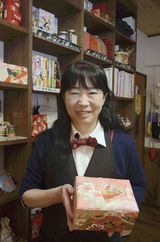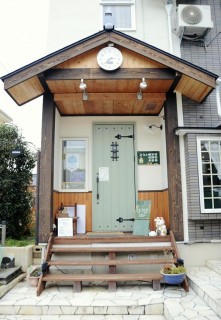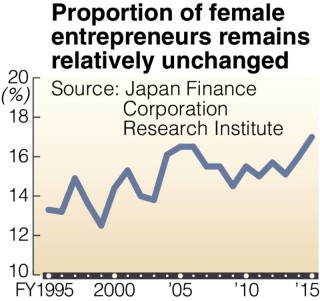Loading
Search
▼ Former Watch Designer Creates Crafty Space
- Category:Souvenir
Two years ago, Yuka Ikoma, 57, opened the Minato Kissabu cafe in a residential area of Shiojiri, Nagano Prefecture. Modeled after a wooden school building, the cafe also serves as Ikoma’s home and a handicraft school. She has come to learn the true meaning of craftsmanship through cooking and making handicrafts.
In 1981, Ikoma joined a precision equipment maker in the prefecture and became absorbed in designing wristwatches. However, after entering her 40s she began to feel something was missing from her daily job drawing wristwatch designs. She wanted to make something from scratch with her own hands.
She began to attend workshops on woodworking, bead art, dressmaking and other crafts, which instilled in her the desire to create a space where she could enjoy making crafts with many people.
Five years after she started going to workshops, she encountered a “knitting cafe” where customers could knit while enjoying a cup of coffee. Students chatted with the teacher after the knitting workshop and sampled tasty foods together.
“This is it!” Ikoma remembered thinking. She had found the ideal concept for her own cafe.
Ikoma stayed focused on her goal even as she continued working at the company, studying baking at a school in Nagoya and cafe management at a school in Tokyo.
In 1981, Ikoma joined a precision equipment maker in the prefecture and became absorbed in designing wristwatches. However, after entering her 40s she began to feel something was missing from her daily job drawing wristwatch designs. She wanted to make something from scratch with her own hands.
She began to attend workshops on woodworking, bead art, dressmaking and other crafts, which instilled in her the desire to create a space where she could enjoy making crafts with many people.
Five years after she started going to workshops, she encountered a “knitting cafe” where customers could knit while enjoying a cup of coffee. Students chatted with the teacher after the knitting workshop and sampled tasty foods together.
“This is it!” Ikoma remembered thinking. She had found the ideal concept for her own cafe.
Ikoma stayed focused on her goal even as she continued working at the company, studying baking at a school in Nagoya and cafe management at a school in Tokyo.
However, she knew that if she quit her job her income would decrease. She was unsure whether to pursue fulfillment or continue her stable life. She was encouraged by her husband, Atsushi, 58, a company employee, who told her not to make a choice she might later regret.
Knowing that they could live on their pension benefits even after he retired, she quit her job at the age of 55 in March 2014.
Ikoma opened the shop about six months later. The name “minato” reflected her hopes for the new venture — “mina to egao ni” means “smiling with everybody.”
Decorating the interior of the shop, procuring necessary equipment and other costs totaled ¥10 million. On the advice of the local chamber of commerce, Ikoma requested a review by the Small and Medium Enterprise Agency that qualified her to receive a ¥2 million government subsidy to promote small business. The subsidy had no obligation for repayment. The remaining ¥8 million was taken from her savings.
The shop operates as a cafe during the day and a restaurant on Friday nights. Ikoma named her cafe’s daily menu “the class newspaper.” Several times a month, the cafe holds a handicraft workshop in which students attach cloth to cardboard boxes.
She also brings in an outside instructor to hold a dressmaking workshop, after which students chat while enjoying Ikoma’s handmade cakes and tea. She keeps fees for the workshops in a low range from ¥1,500 to ¥2,500 for two hours.
Knowing that they could live on their pension benefits even after he retired, she quit her job at the age of 55 in March 2014.
Ikoma opened the shop about six months later. The name “minato” reflected her hopes for the new venture — “mina to egao ni” means “smiling with everybody.”
Decorating the interior of the shop, procuring necessary equipment and other costs totaled ¥10 million. On the advice of the local chamber of commerce, Ikoma requested a review by the Small and Medium Enterprise Agency that qualified her to receive a ¥2 million government subsidy to promote small business. The subsidy had no obligation for repayment. The remaining ¥8 million was taken from her savings.
The shop operates as a cafe during the day and a restaurant on Friday nights. Ikoma named her cafe’s daily menu “the class newspaper.” Several times a month, the cafe holds a handicraft workshop in which students attach cloth to cardboard boxes.
She also brings in an outside instructor to hold a dressmaking workshop, after which students chat while enjoying Ikoma’s handmade cakes and tea. She keeps fees for the workshops in a low range from ¥1,500 to ¥2,500 for two hours.
Revenue from her cafe totals about ¥70,000 to ¥80,000 a month. Nothing remains after covering the costs of food and other supplies, so the couple relies on her husband’s salary. Yuka is trying to attract more customers by launching a website and placing ads in newspapers.
Yuka said customers tell her the food is delicious and the art decorating her cafe is lovely. Her spirit of inquiry toward making things remains unabated.
Govt helps women start businesses
Many women think about starting a business that utilizes their hobbies or experiences, but the percentage of female business managers has not increased much.
According to research by the Japan Finance Corporation Research Institute, the percentage of female entrepreneurs in fiscal 2015 stood at 17 percent of the total, or about one-fifth of male entrepreneurs. The percentage has climbed 3.7 points since fiscal 1995, but it has barely changed in the last 10 years.
“Women often can’t start their own business because they are facing difficulties such as balancing family and work life, or a lack of experience in society,” an official of the Small and Medium Enterprise Agency said.
The government is supporting women’s active participation in society through such means as the Economy, Trade and Industry Ministry’s website “Watashi no Kigyo Oen net” and the agency-operated Sogyo School, which offers workshops on how to start a business.
Yuka said customers tell her the food is delicious and the art decorating her cafe is lovely. Her spirit of inquiry toward making things remains unabated.
Govt helps women start businesses
Many women think about starting a business that utilizes their hobbies or experiences, but the percentage of female business managers has not increased much.
According to research by the Japan Finance Corporation Research Institute, the percentage of female entrepreneurs in fiscal 2015 stood at 17 percent of the total, or about one-fifth of male entrepreneurs. The percentage has climbed 3.7 points since fiscal 1995, but it has barely changed in the last 10 years.
“Women often can’t start their own business because they are facing difficulties such as balancing family and work life, or a lack of experience in society,” an official of the Small and Medium Enterprise Agency said.
The government is supporting women’s active participation in society through such means as the Economy, Trade and Industry Ministry’s website “Watashi no Kigyo Oen net” and the agency-operated Sogyo School, which offers workshops on how to start a business.
- January 18, 2017
- Comment (0)
- Trackback(0)




